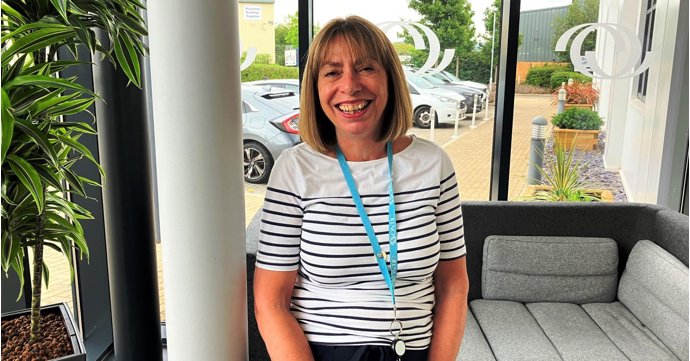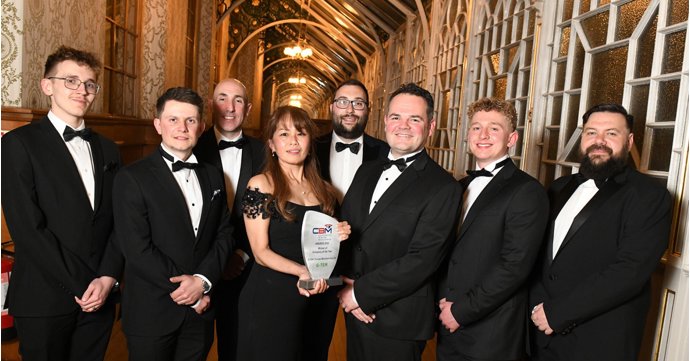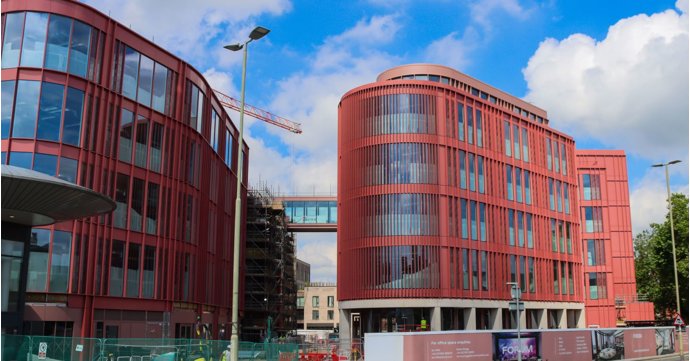Emma Jenkins, site director of Ontic's Staverton branch, has had a thrilling 35-year career working in STEM, from travelling the world to rising through the ranks to become a senior leader at one of Gloucestershire's most advanced aerospace firms.
She chose not to go to university and, instead, started as a trainee at a time when apprenticeships were only really offered to trades — and mostly to boys, post-GCSEs. Now, with a diverse range of apprenticeships offered to all, even people changing careers, SoGlos speaks to Emma about how she climbed the ladder and what her advice to young people would be now she's experienced it all.
Can you describe your career journey?
When I was leaving school, I didn't know what to do. I was going to do A-levels, but I realised I just wasn't that type of person. I wanted to get out, spend some money and get a job!
So, I did two years in the civil service and they put me through A-levels, then I started as a junior trainee buyer. It was in a very traditional engineering and manufacturing environment; and not one that I'd experienced before — but it was a great learning curve, and it kept me on my professional development course up until I graduated with the Chartered Institute of Purchase and Supply. That training course allowed me to become a buyer, then a senior buyer and then a purchasing manager, before going on to run manufacturing operations and entire end-to-end businesses. Over time, I also went on to take a master's in supply chain.
Were you aware of apprenticeships early on in your career?
Had I been able to join a technical apprenticeship, I would have absolutely loved that. But it was only really boys at school who were offered those types of things. I wasn't really on their radar 35 years ago and I hadn’t heard of apprenticeships, other than as an electrician or a plumber, so it was never offered to me or suggested.
It's great to see that nowadays there's so much more variety and so many more options — there's a huge amount out there for everyone.
When did you join Ontic and how is your job going?
I joined Ontic 15 months ago. I'm originally from Gloucestershire and I'd spent the last couple of decades working in different parts of the country and internationally, too. I was really enjoying my job at the time but I was approached by Diane, the recruitment manager at Ontic, on LinkedIn. She asked me to come and have a look at the factory in Gloucestershire and to have a chat about the site director role. I didn't initially think that it would be right for me, but Diane was very persuasive!
So I looked at the site and listened to the business model — and I was taken from the first conversation. It's a fantastic organisation — the culture's brilliant, the growth is just out of this world and the ambition is huge. So it didn't take much to persuade me!
Ontic acquired Staverton in 2021 and there was about 90 people here then. We've grown to about 250 people now — we've filled the site. We have a range of repair work at the Staverton site as well as a considerable amount of new products going through here. We specialise more in mechanical and hydraulic parts, while our sister site in Bishop’s Cleeve, takes the majority of our electronic parts.
In my 15 months there's been a real transformation here. Everything from needing a new car park through to recruiting the right staff with the right skills and experience and
growing our revenue to four or five times higher.
Did you have a mentor at the start of your career and how did that shape your journey?
I didn't have an official mentor, but the managing director of the company I was working for was sort of an unofficial mentor. He coached me a lot and also talked to me about my career. He was one of the reasons why I took on the master's degree.
He helped me understand where my blind spots were and how to deal with them. That inspired me, specifically, to see if I could help people as well, so I've been a mentor over the years to about half a dozen different people.
What sort of challenges have you noticed in the industry over the years?
I think it's always a challenge finding the right skills and the right people with good experience. I've been in manufacturing and engineering for my whole career and over the last couple of decades, the UK has suffered from a skills shortage.
It is really important for Ontic to bring in people who have got skills and experience. The biggest focus for me is producing high-performing teams; and that needs people with the right attitude, behaviours and basic skills.
But I think there was a period of time where the country stopped investing in apprentices; and that was a problem. There was a time where young people thought that apprenticeships were a poor alternative to university and they were told that university is the be-all and end-all. It's great for a lot of people, but it's not the only route.
An apprenticeship is a great career entry point — and I'm really passionate about that. I think it's really under played in schools and in careers advice.
But I think young people now are realising that they don't want to start their career at the age of 21 or 22 with huge debts and no job offers. The type of people on our apprenticeship schemes will have so much knowledge and experience gained during that time, and they will also understand the culture and the business model — that's invaluable for employers.
How do you maintain a good work-life balance and does Ontic help with this?
When I'm at home, I like to have something to escape to. I have a little dog and I live just outside the Forest of Dean, so I spend a lot of time walking and outside in nature. I also read a lot and I like to travel.
At Ontic, we have flexible start and finish times and we also have a great culture of being able to speak up if we're struggling. We offer lots of wellbeing support. We had a brilliant health day earlier this year with local companies on-site to give massages and talks on health and diet.
We also have helplines and support contacts where employees can go for advice on anything, from giving up smoking to financial advice. We have family days and raffles to win prizes and wreath-making workshops at Christmas time. It's important to feel supported and taken care of, and that we're not just a number.
We also do a lot of volunteering charity days where everyone gets a day off each year to volunteer for something. I recently joined a group of people to walk 11 miles through the Cotswolds to raise money for a local school. It was a whole day out of the office, with the phone switched off, just talking and walking with colleagues — it was such a lovely day and great to see people from our other site who I don’t necessarily see every day.
If you could go back and give your younger self one piece of advice, what would it be?
Have the confidence to express what it is that you really want, rather than what you think people want you to do. If I had been more confident I would maybe have done an engineering qualification or an apprenticeship instead. I don't have many regrets though!
And what would you say to young people just getting started?
Meet people; talk to everybody; and don't be worried about talking to the senior leaders.
Talk to the managers, talk to the big boss — everybody's interested in you and your opinion really matters. Talk to as many people as you can and be curious — keep asking why.





















